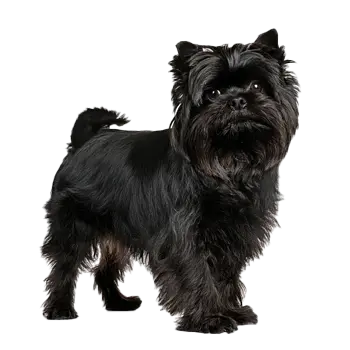Breed Standard
Head: Round. Monkey-like expression. Short muzzle. Slightly undershot bite. Black lips.
Ears: Small, set on high. If cropped, held erect and forward. If natural, v-shaped, drop or held erect.
Eyes: Round. Dark color.
Body: Square body outline. Short neck. Ribs slightly sprung. Well developed breast. Underline slightly tucked up at the loin. Straight short back sloping slightly from withers to croup.
Tail: Docked to approximately three vertebrae. Set high and carried erect.
Hair: Harsh and dense on the body. Less harsh on the head, standing off and framing the face. Bushy eyebrows, full beard.
Coat: Preferably black. Brown or gray markings or nuances permissible.
Size: 25 to 30 cm (10-12 in).
Weight: 4 kg (9 lb) or less.
History
One of the most ancient of toy dogs, the Affenpinscher (translated from German as Monkey-Terrier) originated in Central Europe. During the 17th century, small terriers were frequently kept around stables, on farms or in stores where they served as ratters. Bred down in size, these small terriers became companions in the home and kept mice from overrunning their mistresses' boudoirs. The Affenpinscher is believed to have been a major influence in the development of many of the smaller rough-coated breeds of continental Europe, including the Brussels Griffon and the Miniature Schnauzer. The area around Munich, Germany, eventually became the heart of Affenpinscher breeding in Europe.
The breed was admitted to the American Kennel Club in 1936. This quaint little dog's popularity has been overshadowed by that of his descendent, the Brussels Griffon, but more recently he is enjoying a return to favor.
Behavior
Affenpinschers have a distinct appearance that some associate with terriers. They are different from terriers, however, in that they are actually part of the pinscher-schnauzer subgroup of group 2 in the FCI classification so often get along with other dogs and pets. They are active, adventurous, curious, and stubborn, but they are also fun-loving and playful. The breed is confident, lively, affectionate towards family members and also very protective of them. This loyal little dog enjoys being with its family. It needs consistent, firm training because some can be quite difficult to housebreak. The training should be varied because the dog can easily become bored.
Affenpinschers are somewhat territorial when it comes to their toys and food, so they are not recommended for very small children. This dog is mostly quiet but can become very excited if attacked or threatened and shows no fear toward any aggressor. It is best suited for a family who likes a show and has a sense of humor.
Function
Guard dog. Hunter of vermin. Pet.
Health
A small sample of Affenpinschers in a UK survey had a median lifespan of 11.4 years, which is a typical lifespan for a purebred dog, but a bit lower than most breeds of their size. The most common causes of death were old age (24%), urologic (19%), and "combinations" (14%). The Affenpinscher can get hip dysplasia. As with many small breeds of dog they are prone to collapsed trachea, which is best avoided by walking the dog with a harness instead of a collar. Cataracts are occasionally reported.






